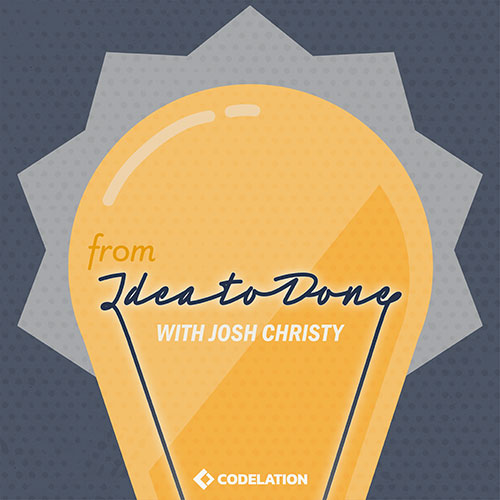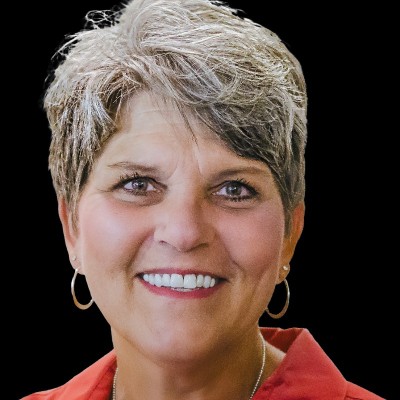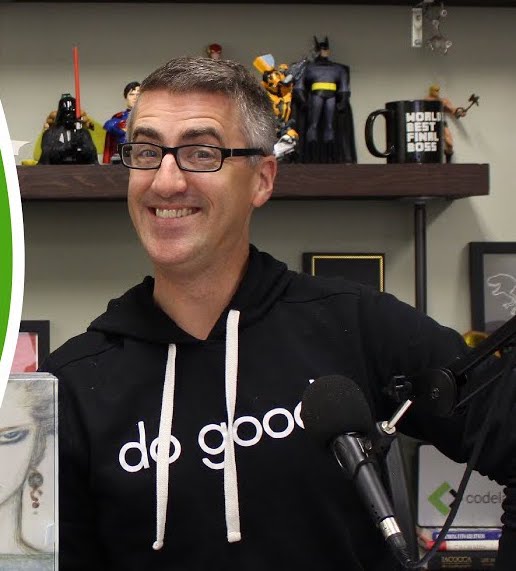Being Good at Building Relationships ft. Patrick Kirby

Developing An API Product ft. Anthony Molzahn
January 5, 2023
Getting Real with Your Tribe ft. Jodee Bock
June 8, 2023Let's get geared up for startup success. Join Josh as he interviews knowledgeable guests from all corners of the entrepreneurial world and gets the answers to the questions you've been asking. Get ready to learn something new on this episode of From Idea to Done. Hey everyone, on this episode we have our good friend Patrick. Patrick, welcome. Oh, thanks for having me. So you've got a little consultancy, I shouldn't say little, you've got a consultancy in the nonprofit space. Tell us a little bit about it. Sure. It's Do Good Better Consulting and I work with nonprofits to help them suck less at fundraising. And yes, it's kind of a boutique shop, really focusing on small and medium-sized nonprofits and trying to figure out, you know, or answering the question on what the hell do they do first. You know, a lot of these nonprofit leaders get roped in or they sign up for, you know, trying to make the world a better place and they end up with, okay, now you need to fundraise a lot. And everybody, nearly everybody I know in the nonprofit space is an accidental fundraiser. And there's not really a good answer on a step-by-step process or what on earth do you do first in order to juggle the 10,000 things that they're doing every single day when they have one or two people who are trying to manage a whole non-profit doing programming and fundraising and marketing all at once. And that's been the real joy in my life is starting this place and sort of helping in that space. Well, that's awesome. That parallels a lot of the entrepreneurs we work with. They've got a passion for something and they jump out and realize, oh shoot, now I've got payroll and marketing and all this other operational stuff that I never thought was gonna be a thing. So you said you work with small and medium nonprofits. Quantify that a little bit. What does that look like? Most likely, if you're raising less than a million dollars a year, you'll probably qualify as a small, medium-sized nonprofit. So less than a million dollars raised, maybe two to five total people at the nonprofit itself, not including maybe program individuals or volunteers or that kind of thing, but people in the office who are running the show is kind of my small medium-sized definition. Okay, give a little background for Patrick. How did your consultancy come to be? Sure, well I've been in the space basically my entire career. I'm out of college, I started working at my old high school doing alumni and fundraising events thing. I was a politics major so I was clearly unemployed after graduation. They don't tell you that in college, thanks. And I got a call and they said, hey we're looking for somebody who has, you know, the personality to go out and meet with people who are sort of alumni. And I said, sign me up, I've got nothing better to do, it sounds great. And I got the bug, I got to learn about, you know, sort of mailings and sort of bulk mailing appeals and that kind of stuff. I ran their weddings, they have a chapel in my old high school, and so I got to learn special events right out of the gate. And after that I went to the Cystic Fibrosis Foundation out of the Minneapolis area and ran the Dakotas and Minnesota fundraising for walks and galas and that kind of thing and made your gifts. And that's where I kind of really got the fundraising bug forever. How does a high school have a wedding chapel? Well, when you're a private Catholic high schooler like mine, you got one. It's a 1934 Gothic building that has a Sisters of Notre Dame chapel in the middle of it. I got married there, so I used my own place of employment as a good venue. And so, yeah, you, but back on the end of the school fund, so you got this little background for schooling, and then I was in this national organization of the Twin Cities helping kids and their families raise money to find a cure for cystic fibrosis, so you get this national perspective, not just this local thing. And then I moved to North Dakota, because my wife is here, and I was recruited out to work at the Ann Carlson Center out of Jamestown, North Dakota, where I was their CBO for about five years. And that was, you learn about capital projects, and then you learn massive, you know, sort of structure on how the nonprofit works. And I took all of this information and was kind of asked by, you know, some of the local foundations here to do some coaching for some smaller nonprofits and the moment where You have that light bulb moment across the table or the coffee shop where they go. Oh, that's how you do this That was the most addictive drug. I have ever had in my entire life and I was like there's gotta be a business model for something like this and either somebody had tried it and failed miserably Or there wasn't anybody in the space to help these small or medium-sized nonprofits figure this stuff out and that was kind of the background that led me to the experience that allowed me to have conversations with these type of organizations and give them clarity. That was kind of my light bulb moment having other people's light bulb moments happen and that was where the kind of the passion for me came from. So really it's I'm passionate about you know, whatever my nonprofits raising money for I may have dipped my toe into the water for fundraising or operations or something in the past, but You're really there to help them unblock the asking for money. I mean, it's Midwesterners Yeah, it's never an easy thing to say give me money for my thing. No What what have you kind of learned along the journey? That's that that stood out to you? Right, well, it's un-sticking yourself from doing, right? So, it's really easy to talk about all these amazing goals that you have and these plans and the way you're gonna ask somebody and then when you get the opportunity to pick up the phone and ask for a meeting or sit across from somebody and make that ask, everybody freezes up. Because they don't think that they know enough to be an expert or answer the questions and that hesitation clams them up right away. You probably know this too, as a business owner where you're maybe asking for capital or maybe asking for an investment or maybe even going into a meeting where you're trying to pitch a product and you get that moment of hesitation, do I really know what the hell I'm talking about? Or do I really have all the solutions for them? And when you're a small non-profit and you're talking about large gifts, or even small gifts, there is this thing in the back of your brain that says, do I even deserve this? Am I even the right, qualified person? And what I've learned the most is everybody knows exactly what you, you know more than everybody else. Everybody has that same hesitation. And then you just need to do it once to make sure that you aren't gonna get punched in the face by somebody who you asked for money for, which has never happened in the history of things, right? And once you don't get punched in the face, you go, oh, that wasn't too bad. And that once it wasn't too bad moment happens, the floodgates of potential and excitement sort of get unblocked. And that's kind of the most exciting, I think, part that I've learned is that if you can unstick them from that first moment, that first hesitation, it's a watershed moment for a lot of these groups. It's something that's so easy when you get uncomfortable in those situations, you just talk and try to explain more, which I think does the opposite intention of, does this person really know what they're doing? Do they know what they're talking about? And it's, you know, Patrick I brought you here today, if we're doing a capital raise, we're trying to raise a million dollars, we would love if you and your organization can contribute. Is that something you're willing to do today? And then shut up. Yeah, and then it's that moment of silence that is only two or three seconds that feels like an hour and a half on the other end. And if you're trying to fill it with stuff, it sounds panicked. It sounds very self-conscious and that is the most difficult thing to do. And I think part of that, the solution to some of that is just asking questions prior to that ask, right? Getting comfortable across the table from somebody, just getting to know them a little bit better. And that, those are some of those little tips and tricks that you pick up after doing this for 20 years is that you end up You know trying to figure out What other what are other people not doing or interacting with this person who's got the capacity to give well? It's being curious they've lost curiosity, and they're just thinking about bottom line Yeah, that relationship building is you know exactly right where it's just not talking I say that as somebody who podcasts and talks endlessly for a living, and I realize that's kind of ironic, but that's the power in pause. That's the power in just sitting back and not doing anything. I mean, even just as human beings to sit outside in a chair with not music or an iPad or something, for some people that's terrifying. Torturous. Yeah. We had a retreat that I went to, and it was 30 minutes of silence. And you saw some of these entrepreneurs get up and they're pacing and they're like, they're, they're getting itchy. Like they don't know what to do. And they came in and stopped it after 10, you know, and they put the 30 out there, but just to see how people would, would handle it. And it was basically, you don't do anything. And then for the next 10 minutes you do a little something. The next 10 minutes you do all the things. And it was really interesting to get back together and see who was comfortable where. Because some people are like, I've got to be doing all the things all the time, and a few people are like, it's actually kind of nice to not have my phone and just turn off a little bit. Anyway. That is really interesting because I feel like everybody who is a non-profit fundraising executive has a bit of entrepreneurial, you know, schizophrenia the way that we all do anyway, because they're constantly thinking of ways to raise money or ways to engage or what to do that's interesting and different and their brain is always working. And so they're very relatable to me as an entrepreneur who is constantly thinking about stuff or whatever. So in real time in which I am coaching and training some of these individuals to pause, I myself am trying to coach myself and understand how to pause too. And it's this wonderful symbiotic relationship where I'm also learning from those who are doing really well in the field and how to apply their fundraising skills to my own business skills.
Sign up to receive email updates
Enter your name and email address below and I'll send you periodic updates about the podcast.
